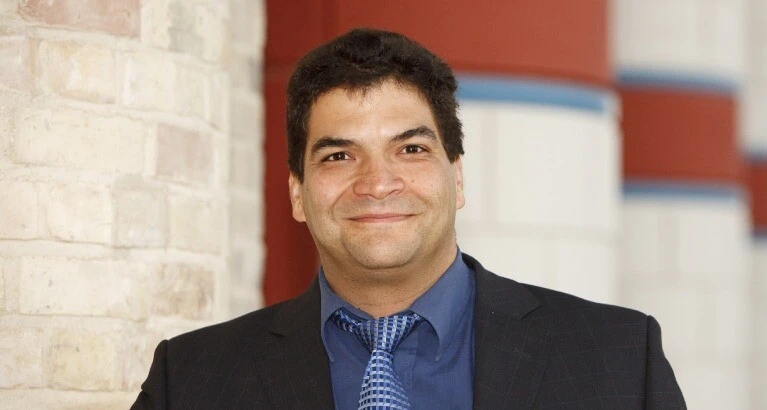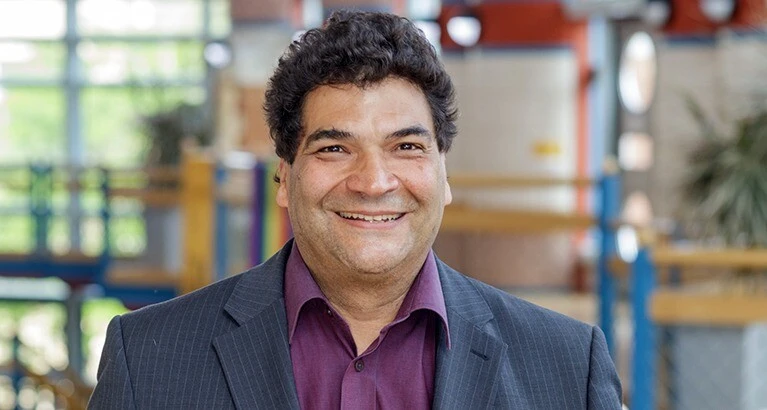Early days in IT and systems thinking
Michael Barrett, Professor of Information Systems and Innovation Studies and Academic Director of Cambridge Digital Innovation, says he grew up in the first era of IT.
Working as an industrial engineer for Colgate Palmolive in the 1980s, he remembers inputting data using Lotus 123 and Excel and doing factory simulations even back then.
“I was doing courses in algorithms before algorithms became fashionable! I knew then I wanted to learn more about technology.”
Building expertise across engineering and AI
He wanted to combine his engineering knowledge, interest in systems thinking with advanced knowledge of computer science. Already holding a BSc degree from the University of the West Indies, Barrett won a scholarship in 1985 to the University of Ottawa. This led him to a masters programme in Systems Science, combining mathematics, control systems, mathematical economics, management and computer science.
“It was a truly interdisciplinary course. I learnt a lot about myself as well as gaining experience and knowledge at a time when the second wave of AI was just taking off. And I went from applied science to wanting to know more about how that technology applied to people and work environments.”
Global consulting and business development
With an MBA from McMaster University, Barrett went on to work for Oracle Canada. Describing it as an amazing training ground, he won the ‘Most Valuable Employee’ award for consulting and business development.
“Oracle was the darling of Wall Street at the time, and I was very fortunate to join when I did. I was travelling all over Canada developing a new line of business in enterprise applications.
“We used to joke that Oracle Canada became self-sufficient when I joined – or at least Larry Ellison stopped flying in on his private jet from California up to Toronto!”
A Cambridge PhD and entrepreneurial ambitions
Looking back on his own experience as a young employee, Barrett today enjoys putting his MBA students before captains of industry and thought leaders.
“The MBA students produce very innovative solutions to business problems. They present as a team at the highest level, with incredible work intensity, and they continually surprise me,” he says.
And he understands what drives them. In 1992 Barrett took his stockbrokers licence but was already looking for entrepreneurial opportunities after Oracle. He was increasingly interested in knowledge and how to develop it in a way that was relevant for business.
“I came to Cambridge to do a PhD in Management – Information Systems. I was at Churchill College, and I still remember a Formal Hall dinner sitting with the Deputy Governor of the Bank of England, the Master Sir Alec Broers and the Vice Chancellor at the time, Sir David Williams. It was just such a fantastic opportunity to meet great minds.”
The MBA students produce very innovative solutions to business problems. They present as a team at the highest level, with incredible work intensity, and they continually surprise me.
Leading digital transformation at Cambridge
Finishing his PhD in the mid1990s, Barrett focused his research on the large-scale implementation of electronic trading and went to work for Lloyd’s of London. Lloyd’s, he says, as a specialised insurance marketplace was a bedrock of commercial innovation, which it attributed in part to traditional manual placement practices in the City. It was, he says, “a very challenging time to introduce technology at the front end of the business but also one of great learning and insight on management of change issues in the early days of large-scale IT change.”
His own work experience increasingly led him to draw on practice-based theories in his research for understanding digital innovation and transformation. In 2001 a chance opportunity brought Barrett back to Cambridge, to Cambridge Judge Business School.
“I was very excited to be part of a young vibrant business school at the heart of Cambridge, and I have never looked back. It has been an incredible opportunity and rewarding experience!”
Shaping the future of AI and innovation
He describes arriving as the second wave of AI and ecommerce gave way to the third wave of AI. From the outset Barrett focused on the importance of digital technologies and how they can be strategically applied and the implications for work practice.
“The students I teach today are born digital. But that does not necessarily translate to understanding how to think digitally about business strategy and transformation.
“In the third wave of AI, digital innovation and transformation have never been more important. I try to unpack the foundations at the core of any digital business. We explore how emerging digital technologies, business models and changes to the business ecosystem are reshaping corporate strategy, and how to implement these changes into organisations.”
In the third wave of AI, digital innovation and transformation have never been more important. I try to unpack the foundations at the core of any digital business. We explore how emerging digital technologies, business models and changes to the business ecosystem are reshaping corporate strategy, and how to implement these changes into organisations.
Connecting the Business School to the wider Cambridge ecosystem
Barrett is Vice-Dean of Strategy and University Engagement at the Business School and a Board member of Innovate Cambridge, which is helping to develop Cambridge as an innovation and entrepreneurship hub in Greater Cambridge, especially across life sciences and the digital ecosystem.
“I am passionate about connecting Cambridge Judge Business School with the wider Cambridge landscape. We continue to develop very close contacts with the West Cambridge Science and Technology Campus, for example.
Exploring fintech and digital health innovations
“There is some amazing work going on in the Maxwell Centre, a centrepiece for industrial engagement with physical scientists and engineers. At the new Cavendish Laboratory there are exciting path breaking opportunities in Quantum and Advanced Materials. These technological developments are going to be shaping the future of business, and it is important for our MBA teams to get plenty of exposure to technology commercialisation and the opportunities for large companies, as well as smaller digital entrepreneurs.”
Barrett is also a member of the Organisational Theory and Information Systems subject group at the Business School, which is engaged with cross disciplinary themes including digital health, fintech and the use of mobile money for international development.
His own research includes:
- digital innovation and artificial intelligence
- online communities for health support and digital healthcare innovation for personalised medicine
- fintech and disruptive innovation in banking
- mobile platforms for financial inclusion and clean energy
- service innovation and knowledge exchange in cross cultural and multidisciplinary teams
Leading digital transformation learning on the MBA programme
Barrett leads the Digital Transformation Concentration on the MBA, examining digital innovations such as AI and digital twins, and how the commercialisation of these technologies can facilitate new business models and enable dynamic ecosystems across different industries including healthcare and financial services.
One of Barrett’s many interests are in how mobile platforms are enabling financial inclusion and clean energy in emerging economies.
“The marvellous thing”, he says, “about the Cambridge ecosystem is that there are always new contacts to make.
“There are small exciting nimble AI companies as well as huge corporations like British Telecom who work with our MBA students. Our students get the chance to apply and develop their digital skills and business knowledge in ongoing business situations and consider the implications of these digital futures.
“We are living in an uncertain world with tremendous technological change and as geopolitics unfold there is a great attractiveness in being in Cambridge. I feel we are well positioned both geographically and at the centre of business and technological advancement.
“Students come here to develop their individual skills and build global networks. They learn to work better as teams to show what they can accomplish. And I am always impressed with the level of excellence they achieve – and the amazing answers they come up with to today’s and future challenges!”
Students come here to develop their individual skills and build global networks. They learn to work better as teams to show what they can accomplish. And I am always impressed with the level of excellence they achieve – and the amazing answers they come up with to today’s and future challenges!





